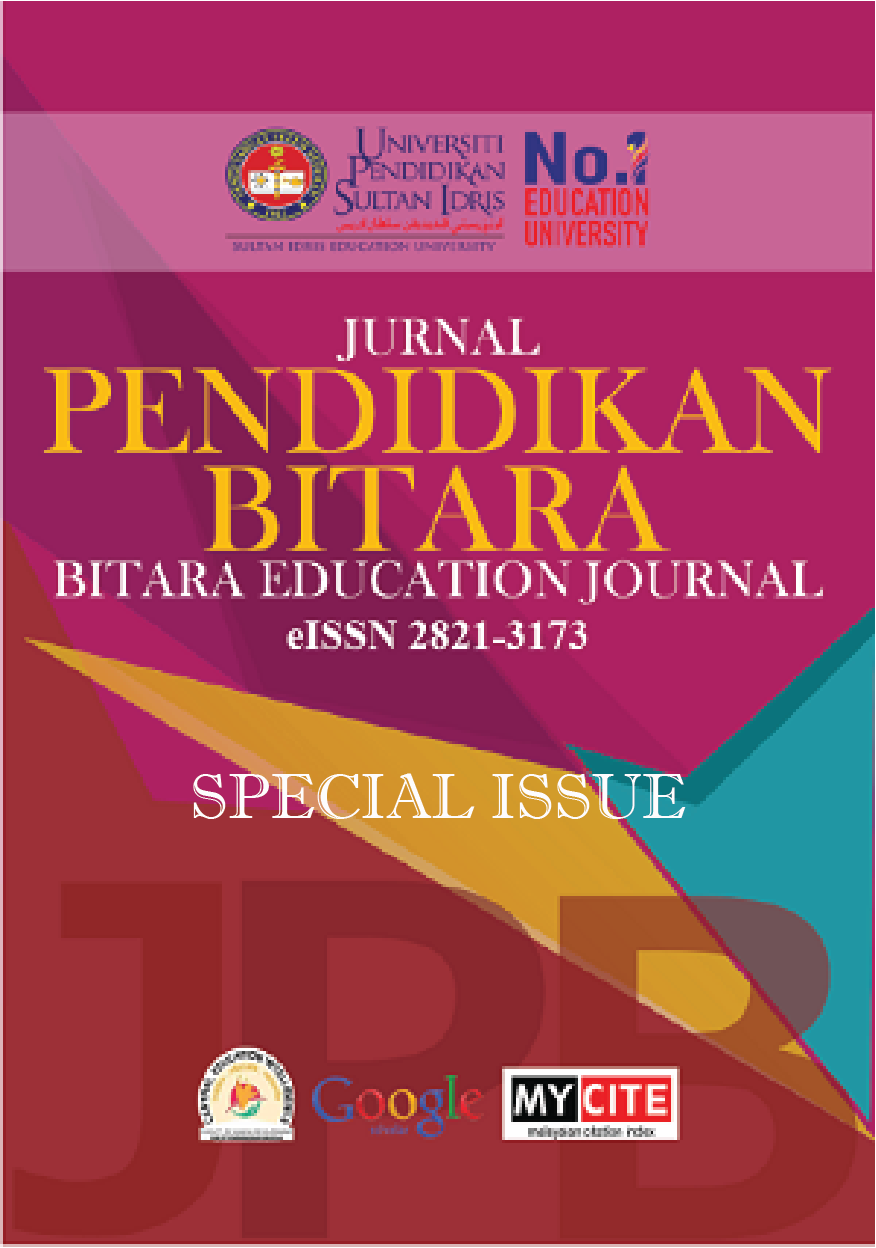Factors that influence the change of behavior of Young Prisoners in Prison: From the perception of Civil Servant JUSA C
Faktor-faktor yang mempengaruhi perubahan tingkah laku Banduan Muda di Penjara: Dari persepsi Penjawat Awam JUSA C
DOI:
https://doi.org/10.37134/bitara.vol16.sp2.5.2023Keywords:
Positive youth development, recidivist, Penal Code, Children’s ActAbstract
Every adolescent categorized as a young offender, young person on remand, young prisoner or juvenile offender is placed at Integrity School. They were found guilty of various criminal cases, from murder, rape, robbery, and others, subject to the Penal Code and the Children's Act. The study of 50 civil servants consisted of Grade C Principal Officers (JUSA C) following the Advanced Leadership and Management Program (ALMP). They held sessions with 112 young prisoners and young remand in Kajang Prison. This study applies quantitative approach in the process of data collection and data analysis. This study aims for the continuous evaluation of (JUSA C) civil servants to be able to make important decisions in several areas regarding the progress and implementation of the rehabilitation program and then facilitate the next steps necessary by the Malaysian Prisons Department. Rehabilitation programs conducted in prisons successfully produce positive-minded juveniles through an adequate rehabilitation system, emphasis on disciplinary aspects, effective motivational programs, family support, and religious approaches to assist in rehabilitation before release. The study found that religious elements, family support and motivational programs are the main factors that successfully
Downloads
References
Akbari, B., Abolghasemi, S., Taghizadeh, G., & Dastaran, A. (2012). Evaluate the effects of anger management skills training to reduce aggressive male prisoners. Journal of Basic and Applied Scientific Research, 2(9), 9590-9593.
Asmawati Desa (2006). Psikologi Untuk Golongan Profesional. McGraw Hill.
Bandura, A. (1977), Self –efficacy: Toward a unifiying theory of behavioral change. Psychological Review, 84, 191-215
Chan, V. (2009). An assessment of the effectiveness of an eight session anger management program for minor criminal offenders in the community (Doctoral dissertation). Available from ProQuest Dissertations and Theses database. (UMI No. NR68162).
Chen, G. (2006). Social Support, Spiritual Programme, and Addiction. International Journal of Offender Therapy and Comparative Criminology, 50(3), 306-323.
Colvin, M. (2007). Applying Differential Coercion and Social Support Theory to Prison Organizations. The Case of the Penitentiary of New Mexico, The Prison Journal 87, 367-387.
Chua Yan Piaw (2013). Asas Statistik Penyelidikan, Analisis Data Skala Likert. McGraw Hill.
De Jong, P., & Berg, I .K. (2001). Coconstructing cooperation with mandated clients. Social work, 46, 361-374. Theses database. (UMI No. NR68162).
Deffenbacher, J, L. (1992). Trait anger: theory, findings and implications. In J.N. Buctcher, & C.D. Spielberger (EdS), Advances in personally assessment (pp.177-201). Hillsdale, J.N: Lawrence Erlbaum Associates.
Dunsworth, M. & Billings, D. (2012). Effective Program Evaluation, Bloomington: IN, Solution Free Press.
H. Jalaluddin (1996). Psikologi Agama. (Jakarta: Divisi Buku Perguruan Tinggi, PT Raja Grafindo Persada), 160-165.
Khalim Zainal. (2008). Memahami tingkah laku remaja bermasalah dari perspektif Teori Tingkah Laku, Humanistik, Psikoanalitik & Tret Personaliti. Jurnal Pengajian Umum, 9, 43–56.
Jabatan Perangkaan Malaysia. (2019). Children statistics, Malaysia. Diperolehi pada 10 Mac 2022, dari, https://www.dosm.gov.my/v1/index.php?r=column/pdfPrev&id=TVY4ZDdTeFJnMFQxWjd Fc1dDZEhOZz09
Mohammad Rahim Kamaludin, Nadiah Syarini Md. Shariff, Azizah Othman, Khaidzir Hj. Ismail, & Geshina Ayu Saat. (2014). Socio-demographic and mechanical profiles of Malaysian male murderers: A descriptive study. International Journal of Biomedical Research, 5(2), 81-886.
Nazirah Hassan & Muhammad Amirul Aidil Rosly. (2021) Vocational Education and Training for Young Offenders in Juvenile Approved Schools. International Journal of Academic Research in Progressive Education and Development,10(1), 642-650.
S Diel, Story project gives prisoners a chance to keep family ties, Diperoleh pada 19 Januari 2022, dari http://www.thefreelibrary.com.
Siegal L. J. (2002). Juvenile, Delinquency: The Core. Belmont. Wadswort/Thompson Learning.
Udrow, W. J. Nazirah Hassan & Muhammad Amirul Aidil Rosly. (2021). Vocational Education and Training for Young Offenders in Juvenile Approved Schools. International Journal of Academic Research in Progressive Education and Development,10(1), 642-650.
Wan Roslili Abd. Majid & Najibah Mohd Zain. (2015). Isu Dalam Penahanan dan Pemulihan Banduan di Malaysia. Jurnal Kanun, Dewan Bahasa Dan Pustaka, 27(1), 143-168.
Weiner, B. (1990). History Of Motivational Research In Education. Journal Of Educational Psyhology. 82(4), 616-622.
Zainudin Sharif & Norazmah Mohamad Roslan (2011). Faktor-Faktor Yang Mempengaruhi Remaja Terlibat Dalam Masalah Sosial Di Sekolah Tunas Bakti, Sungai Lereh, Melaka. Diperolehi pada 21 Januari 2022, dari http://eprints.utm.my/12174/1/JEPC-2011-1-007.pdf
Diperolehi pada 28 Januari 2022, dari http://journalarticle.ukm.my/9843/1/1249234078-1-SM.pdf
Diperolehi pada 24 Januari 2022, dari http://ww1.utusan.com.my/utusan/Bicara_Agama/20121226/ba_01/Masalah-moral-remaja
Diperoleh pada 20 Januari 2022, dari http://jurnalkanun.dbp.my/wordpress/wp-content/uploads/2014/12/8-kanun.pdf
Downloads
Published
How to Cite
Issue
Section
License
Copyright (c) 2023 Azura Abdul Raof, Haslinda Hasan, Azhan Anuar

This work is licensed under a Creative Commons Attribution-NonCommercial-ShareAlike 4.0 International License.





